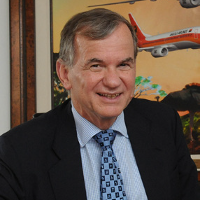Q: What’s your view on the current state of the African airline industry?
A: Africa in some respects is the ‘last frontier’ for global commercial aviation: geographically huge with astounding demographics, anyone can see the long-term opportunities. The industry is held back by a combination of issues, not just traffic rights; the restrictions across borders, the lack of freedom of movement and the absence of open markets limit the ability of airlines to operate profitably. African governments have to wake up to the massive economic benefits of tourism and air access for which there are any number of examples.
Q: Do you believe we’ll see open skies in Africa in the next decade?
A: Frankly, I doubt it. The states with already substantial carriers like South Africa, Ethiopia and Kenya will push for it; small states with no hope of establishing their own airlines will support it. The group in the middle are unlikely to welcome it. People should concentrate on simplifying visas and immigration rules before issuing another meaningless deadline about African open skies.
Q: Do you have any new routes in the pipeline or regions you’d like to expand further into?
A: TAAG is engaged in sensible, measured, profit-enhancing growth. We recently dropped three routes and have started one – Luanda-Maputo – and are increasing our frequencies to Portugal, South Africa and Brazil.
Q: Do you believe Luanda has a role to play as an African hub in the future?
A: Luanda has a naturally good location to support South-South connections (Brazil-China, South Africa-Argentina), as well as Southern Africa-Europe. With a new airport coming soon, TAAG only needs a few more aircraft to become a real player in the African hub markets.
Q: Where do your two Brazilian routes fit into the TAAG strategy and what sort of traffic – and from where – are you seeing on these routes?
A: Brazil and Angola are closely connected for historical and now cultural and educational reasons. It’s a core route with a mix of local and connecting traffic. Students, businessmen, tourists; doctors, singers, artists – we carry everyone.
Q: What are you doing to meet passenger demand for technological advancement and digitisation?
A: Our website was totally refreshed about 18 months ago – and we’ve had a six-fold increase in revenues from it as well as high uptake of features such as web check-in. Digitisation is critical and we’re concentrating on upgrading our basic infrastructure in that area.
Q: Have you made any changes to your fleet recently?
A: In the last 18 months we took delivery of two of the latest Boeing 777-300ERs with semi-private suites in first, lie-flat seats in business and 34-inch pitch in economy. We have dedicated these aircraft to our prime Lisbon route.
Q: Are there any new developments to your onboard product?
A: We are introducing a variety of new menus, both ex-Luanda and from our major 777 outstations. With new linen, pillows and duvets, we are aiming to dramatically improve our premium cabin offerings.
Q: What are you doing to encourage your customers to book in business or first class?
A: We have hugely improved our reliability and on-time performance over the past two years, achieving consistently the international standard of 85% departures within 15 minutes of schedule. We are also hiring new cabin crew and, apart from the catering focus, are insisting on much-improved engagement with the passenger, and consistency of service. Furthermore, we are running a ‘J-Up’ promotion in South Africa, where customers booking certain fare types in business are automatically upgraded to first on our routes to Portugal and Brazil.
Q: What can travellers expect from the TAAG business class cabin?
A: Plenty of personal space, even on our domestic and regional Boeing 737 fleet where we offer 12 business class seats, together with a ‘lie-flat’ seat on our services to Lisbon. We serve a great standard of cuisine, Portuguese wine, and a range of amenities, plus a level of personal service from our cabin crew which equals or surpasses that of our competitive airlines.
Q: Are there any global airline trends you’ve picked up on that you believe are worth noting and could be applied to the African market?
A: Airlines around the globe are forced to become more efficient year by year – economics is driving this, especially in markets where there are open skies and free movement of people. We have seen consolidation in Europe – the demise of Air Berlin, Monarch and the likely failure of Alitalia show that unless you have large scale or large scale and low costs, the future is going to be hard. Africa is still a much protected continent but we see the beginnings of what I call a ‘real’ market in South Africa – where there is already effective deregulation and the frequent entry and exit of airlines.

